UPDATED March 2026
For those of you who are blessed with living elderly relatives, you still have access to a treasure trove of memories, details, and more when it comes to your genealogy research. You can supplement all your online and other methods of research with interviews specifically geared toward these elderly relatives so you can gain valuable information.
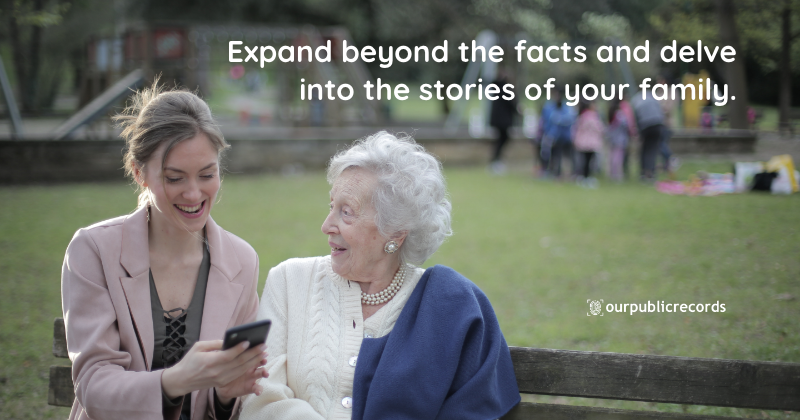
Introduction to Interviewing Elderly Relatives for Family History Research
Perhaps stories have been passed down, and you’ve already heard many of them. Yet, these stories may also invoke curiosity, adding more questions to what you would like to know and share with other family members. Interviewing your elderly relatives can provide you with pieces to a puzzle or answers to a mystery you encounter in your own research.
Why Interviewing is Key to Uncovering Family History
Today you have the benefit of being able to conduct much of your research online while also compiling important papers and documents, journals, or diaries directly from family members.
Yet, supplementing these with actual interviews with your relatives can add a whole new personal dimension and provide special insight into the emotions, traditions, cultures, and events throughout the span of their lifetimes. They can help you uncover details, discover surprises, and tie in history with your particular family.
More importantly, interviews with your elderly relatives lead to stories, and these stories make your research more personal. You can gain insight into all the names, dates, and events and establish a more thorough history of a family member’s lifetime experiences. You can also gain context surrounding historical eras first-hand.
Interviewing is key to uncovering family history because it can uncover key information or confirm what you have, such as the names, important dates, and locations, while also providing more detailed information. Another way interviewing helps is that it can provide a recording of oral histories, such as of a relative’s younger years, which can become a family treasure to future generations.
If your great-grandparents immigrated to America but are no longer here to tell you of their experiences, your living relatives may be able to provide clues that you can then research to gain a historical perspective. You may find a jumping-off point to refocus your research or enjoy the confirmation of what you’ve already found. The possibilities are limitless.
Additional resources:
6 Reasons to Interview Your Relatives, Family Tree Magazine
Uncover Stories and Bridge Generations by Elizabeth Keating, Ph.D.
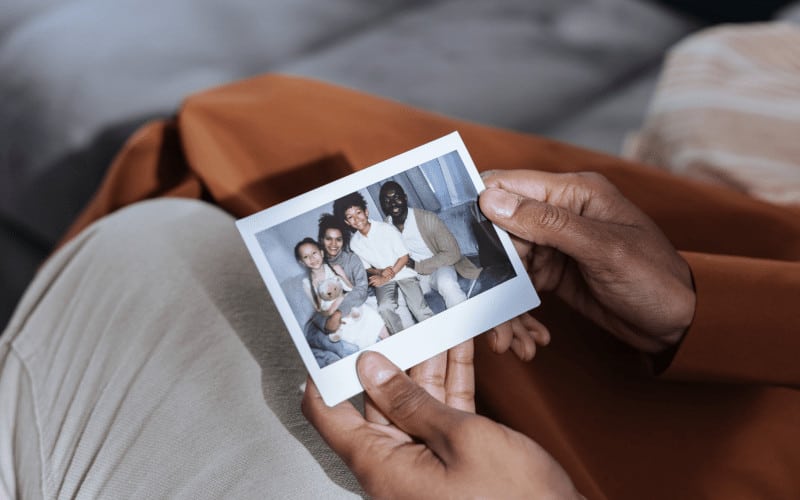
Beginner’s Guide to Interviewing Elderly Relatives
Now is the ideal time to get started, especially if you have one or more elderly relatives available to provide you with first-hand accounts of their lives, memories, and more. Start by making a list of how many elderly relatives you have, where they live, and how you can best interview them (face-to-face, over the phone, or by video conferencing).
Below you’ll find information on how to prepare for and conduct the interviews, what questions to focus on, best practices for recording and transcribing your interviews, and a few tips and tricks to get you started.
Preparing for an interview
Before the actual interviews, start preparing ahead of time. Consider what it is you wish to know, such as more about those early years, how the children were raised, or what life was like during a specific time period or historical event. Once you have a general idea, conduct your own background research so you can feel better prepared for the conversation.
Call or visit each relative you plan to interview ahead of time and schedule a time to get together that is most convenient for them. Also, give them a brief overview of what you want to ask about so they know what to expect and can already be thinking about the topic before the interview occurs.
Additional resources:
Genealogy Basics Chapter 1: How to Interview Relatives, MyHeritage Blog
How to Prepare for an Interview With a Family Member, Remento
How to conduct an interview
How you go about conducting an interview with a family member will be different than with others because it is more personal. You will need to show respect, empathy, and friendliness throughout. If they tire easily, you will also need to be understanding and flexible enough to reschedule if necessary.
Come prepared with questions to get and keep the conversation going while also remaining open for any memory that comes up or the person is excited to share. You want to avoid being too rigid and business-like. You also don’t want this to seem like an interrogation, but consider it more of a casual discussion.
Be attentive, letting them talk in whatever manner is normal for them. Try not to interrupt, holding your follow-up questions or comments until you see they are taking a pause.
Conduct the interview while sitting at a kitchen table, on the front porch, or taking a stroll around the neighborhood or park. Find what works best for your relatives to keep them at ease and open to talking.
Be sure to document what you learn, either by taking notes or recording the conversation. You may even wish to video the interview, if that is acceptable to your elderly relative. Still, this may make elderly relatives uncomfortable, so find what will work best to make them feel most relaxed.
Additional resources:
Conducting a Family History Interview, American Ancestors
How to Conduct a Family History Interview, LegacyTree Genealogists
Conducting Family History Interview, American Ancestors by New England Historic Genealogical Society
What questions to ask
The biggest step in your preparation for interviewing is knowing what questions to ask. Yet, the questions you prepare prior to the interview need only serve as a guide, a suggested structure in which to keep the conversation going. You’ll want to make them concise but also open-ended, prompting the interviewee to continue with any thought patterns or stories that come to mind.
Start with the basic biographical questions about such things as full names, places of birth, and the towns or cities they grew up in or moved to at some point in their life. You can also let them help confirm other relatives’ names and dates of marriage, death, or immigration. All of this will provide you with a timeline or chronology to confirm and build upon.
Additional subjects you may want to ask about include:
- Family traditions and customs
- Holiday celebrations and locations
- Cultural influences
- Hometown descriptions
- Childhood experiences
- Historical events that occurred during their lifetime and how each one impacted the family
- Family heirlooms, photos, or other items.
To help with this last one, bring out family heirlooms or mementos and ask about them. These can be old photographs or documents which can spark more memories in your loved one. Find whatever you can, such as scrapbooks, family bibles, letters, or immigration documents to help you both focus on specific questions. You might also want to ask if there are any other family items that can provide more information or contain a family story not yet written down.
Additional resources:
Questions to Interviewing Family Members, Ancestry.com
50 Questions to Ask Your Relatives About Family History, thoughtco.com
Interview Questions and Prompts for Family History Interviews, Family Tree Magazine
Life Interview Questions – Childhood, LegacyProject.org
100 Questions a Family Historian Should Ask Relatives, Family History Daily
Best practices for recording and transcribing
One way to preserve your family research is to record and transcribe interviews with your elderly relatives. This will not only provide a personal keepsake for you and following generations, but it can also remind you of details as you continue your research.
A few best practices for recording your interview are:
- Find the best recording equipment for the type of interview you will conduct: in-person, over the phone, or online (video conferencing). Once you choose, become familiar with how it works so you won’t cause delays fiddling with it during the interview process itself.
- Find a quiet location with a low risk of interruptions or distractions.
- Start your recorded interview with a little information on what will follow, such as your name and who you are interviewing, the date, and location of the interview.
- Start a natural conversation with your relative, then bring in more specific questions or prompts. As your relative answers each question, you will gain a sense of whether they prefer to give short, brief answers or prefer to go into details. You’ll need to prompt them if they stop talking.
To transcribe the interview afterward, here are some options.
For online video conferencing, you can work with a company such as Rev to transcribe your chat. If you use Zoom, you can also just send them the link, and they will create a transcript for you.
For phone interviews, find a recording app that will easily record your conversation or use a small recorder set up next to the phone’s speaker. You can then listen to it over and over as you get the details down in words.
In-person interviews also require a recording device, after which you can send the video or audio for transcribing via a specialized software or type out what was said yourself.
As an additional step, you can use audio or digital editing software to edit out sections or to rearrange any part of the interview so that it flows better or only entails what you need for the research. You can also edit it into blurbs and file those under their specific topics.
Additional resources:
Touching Tomorrow: How to Interview Loved Ones…on Video or Audio, Mary LoVerde
Getting started with recording, Zoom Support
How to Record an Interview on Your Smartphone, Family Tree Magazine
How Do I Transcribe Oral History Recordings, University of Leicester
Audacity, for audio editing
Pinnacle Studio for video editing
Tips and tricks for beginners
To help you get started with the process of interviewing elderly relatives and enhancing your family history search, here are some tips and tricks for beginners.
- Conduct research beforehand and create both specific and broad questions.
- Bring along family heirlooms, photos, documents, or whatever you want to talk about and to help prompt specific memories.
- Practice setting up and using your recording device ahead of time to be sure you are familiar with it and know how it works. This can help you avoid delays in getting started and frustrations that can accompany new technology.
- Open up with a conversation before turning on a recording device to help get your relative more comfortable with you and the process.
- Remain sensitive to your elderly relative’s reactions to the memories they share.
- Avoid interrupting. This is their time to shine, and your role is to guide them.
- Even if you are recording, take notes about details, follow-up questions, and any research you will want to conduct later on.
- Soon after the interview, make a transcript for your records.
- Make backup copies of the recording.
- Locate and scan any items your relative talked about or mentioned.
Additional Resources:
Interview Relatives, The Family History Guide
5 Tips for Interviewing a Relative, FamilySearch
Interviewing Mom and Grandma: Oral History Tips, Genealogy.com
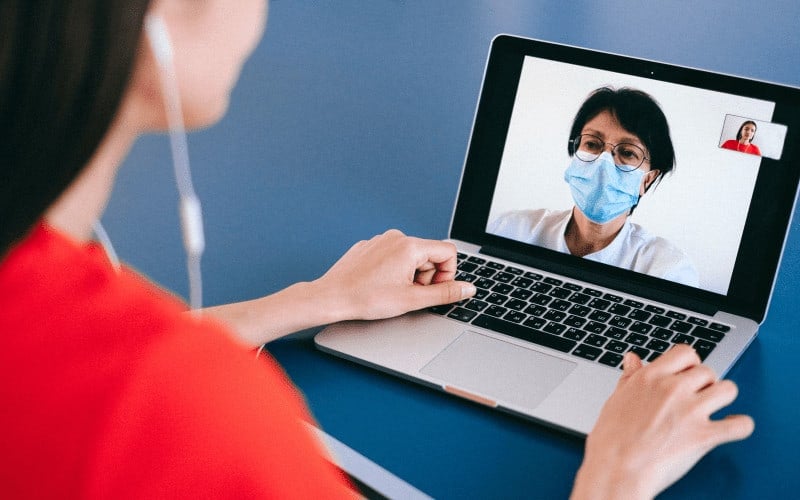
Intermediate Interviewing Skills
Once you gain experience in conducting genealogical research, you are likely to locate information you didn’t previously know about, sparking more curiosity. Now would be a good time to interview your elderly relatives again, or some for the first time. Here are some intermediate interviewing skills you can use to obtain additional family history data and stories.
Advanced interview techniques
After compiling all the information from initial interviews, determine what else you want to know or if there are holes somewhere. You may then need to schedule second interviews or seek out another relative to provide additional information.
Schedule a time with them to talk about a particular timeframe or subject, such as holiday celebrations, military service, or life on the farm.
Ask more open-ended questions, allowing your relative to answer in any way they like, which can reveal more than you would receive in straightforward ones.
Keep the interview focused and proceed in the direction you wish to go in order to gain specific information. Your relative may feel relieved that you only want them to remember certain things instead of everything under the sun.
Find a way to circle back to a topic that your relative either couldn’t remember much about or seemed uncomfortable to discuss. They may be able to reveal that information from a different angle. If not, make a note of it and seek out other relatives to help flush out the experience or historical event.
You can also provide them with a scrapbook, photo album, or documentation and ask them to review it at their convenience. If any other memories come to mind, mention that they should write them down or contact you directly.
Finally, don’t remain rigid to the set of questions you brought with you. One answer can prompt you to ask another related question that you hadn’t thought of earlier. For example, if you’re loved one mentions going to church, follow up with questions about the service, people, and other events associated with that experience. With this, you can gain familiarity with the beliefs of the time and that of your family.
Additional resources:
The Smithsonian Folklife and Oral History Interviewing Guide
28 Family History Interview Tips, Family Tree Magazine
The genealogy interview: Asking relatives questions to grow your family tree, New York Genealogical and Biographical Society
How to probe for more information
To get deeper into your family history, you may need to probe for more information. For this, you will need to help your elderly relative by asking a different type of question.
Start by reviewing any information you have on that relative’s younger years and later on. With this, think up several creative questions that speak to something in particular about their life. It may be something about quilting and where the material came from to make those quilts. Perhaps your relative served in the military, so you ask about life aboard ship. These types of questions can segway into descriptions and details you otherwise wouldn’t have learned, or your relative might not have remembered previously.
Additional resources:
40 Thought-Provoking Questions to Know Your Family
Family History Questions, Ancestral Findings
Learn How to Uncover Important Family Stories & Secrets
Interviewing multiple relatives
One way to gain more details, and viewpoints, is by interviewing multiple relatives at the same time. Why this helps is because when one begins to tell a story, it may elicit a memory in another relative but with a slightly different take or experience. Many people feel more comfortable when in a group and can open up about details and share memories. Plus, you can learn about different perspectives and more details of certain events. Listen as your relatives converse. For example, imagine what you might find out from a set of twins in the family who confess to switching places on their dates back in high school.
7 Tips for Effective Family History Interviews in a Group, Family Tree Magazine
Using storytelling to elicit memories
While you can ask specific questions and receive short, concise answers, such as your loved one’s age at marriage, encouraging storytelling can help to elicit memories. To learn more, ask conversational-type questions that draw your relative into telling that story. These are the types of interviews that often contain special details you might miss if you are unaware of what questions to ask. Plus, the stories provide a more personal touch to your research.
Additional resources:
What’s Your Story? Conducting Interviews for Genealogical Research, New York Public Library
Story Corps: Great Questions
Family History Storytelling and Sharing, Family Tree Magazine
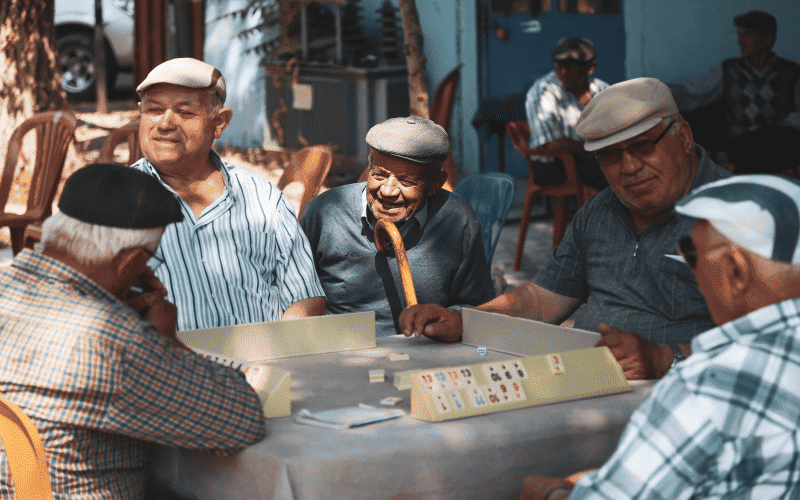
Advanced Interviewing Skills
As you continue conducting interviews, compiling transcripts, analyzing what you have, and discovering what is missing, you’ll want to continue advancing your interviewing skills. To help, consider incorporating the following.
Building a research plan and workflow
A research plan can help you better organize your methods and thoughts when it comes to family history research. It can help assure that you capture the various types of information, steer you in a defined direction, and help you navigate the flow of information.
Start by determining your overall objective for your genealogy research. What do you wish to achieve? From there, break the process down into steps, or a defined workflow, to help you reach your objective. A research plan usually focuses on one relative or aspect of their life, such as identifying the role your great-grandfather played in WWI, but it can be anything you want it to be.
As you create your plan, you will most likely see that you need to do more document and online research, and this can lead you back to conducting more interviews with your elderly relatives.
Additional resources:
How To Create Genealogy Research Plan: A 5-Step Example, Family Tree Magazine
Develop a Genealogy Research Plan with 7 Simple Questions, The Armchair Genealogist
Research Plan Template, American Ancestors
Analyzing and interpreting interview data
Interviews reveal memories of individual relatives, and you will need to analyze and interpret that information in line with your research question. How does it add to, detract from, or create a mystery surrounding the question you are attempting to answer through research?
Consider the clues provided in the interview narratives, then seek official documents, newspaper articles from the times, and anything else you can think of to validate or add to the topic. In other words, look at the information you have from the interview and identify where any holes exist that need further research.
Resources online traditionally refer to documentation and records to analyze, but you can use the same concepts and apply them to your interview data.
Additional resources:
Analyze Your Research – A Skill Every Genealogist Needs, Family History Fanatics
How to Analyze Genealogical Sources, The Family History Guide
Identifying and resolving conflicting information
Often, when you compare your interview notes with documentation or other information you have mined out of records or historical sources, there can be a conflict. Initially, this can be confusing, wondering if you missed something. Look at these as research challenges.
Search for more documentation to discern which version is correct. Contact other relatives and ask to interview them around the topic. For example, if your relative tells of her parents immigrating through Ellis Island, yet you can find no mention of their names on passenger lists in the Ellis Island database, you have a conflict in your information. You will need to expand your search. In this particular instance, historical references may lead you to Castle Garden, where immigrants arrived prior to Ellis Island in New York.
Additional resources:
Analyzing Your Family Tree: Decoding Conflicting Evidence, LegacyTree Genealogists
Conflicting Evidence in Genealogy: Examples and Solutions
When Details Disagree: 8 Ways to Resolve Conflicts… Family Locket
Using interviews in conjunction with other genealogy research methods
Interviews play an important role in family history research and can be complemented with other genealogy research methods. Keep a list of other research sources you regularly can consult, such as US census records, gravesite finders, courthouse documents, military records, newspaper databases, and others. Keep a research log, citing all your sources so you can refer back at any time.
Additional resources:
Resources for Genealogists, National Archives
Genealogy: Essential Research Methods, by Helen Osborn Osb

Additional Resources for Interviewing Elderly Relatives
To help you conduct interviews with your elderly relatives, consider utilizing the many available resources available today. In particular, look for the following.
Online courses and tutorials
High-quality and informative online courses and tutorials can help you get started with your interviewing strategy and allow you to discover new techniques that may be more successful than your previous ones. Search for ones from reputable sources and read reviews to determine if others are benefiting from the information provided.
Additional resources:
12 Tips for Interviewing Family, Genealogy TV
Interviewing Family Members to Grow Your Family Tree, Ancestry.com
Classes and Webinars, BYU Library, Family History
Books and publications
You can also find guidance in the various books and publications available to genealogists today. As new sources and strategies continue to evolve, you can gain unique insights into your own research plan and techniques and find more ways to accomplish your goals and objectives. Find genealogical associations that publish newsletters and other publications and join to gain access. Ask for recommendations for books that can further your research.
Additional resources:
300 Questions o Ask Your Parents Before It’s Too Late, Shannon L. Alder
Oral History for the Family Historian: A Basic Guide (Oral History Association)
Interview question templates and checklists
While you can probably come up with a list of questions to ask elderly relatives on your own based on what you know or the documents you have, looking at question templates and checklists can facilitate an even better list. These can also help you add more depth to your research where warranted and identify topics you may have missed or forgotten about. They can also help you become more creative in your questioning.
Additional resources:
Free Ancestor Biographical Outline Form Download, Family Tree Magazine
Family Tree Interview Questions, familyeducation.com
Family Tree Interview Questions, familyeducation.com
Tips for conducting remote interviews
In some cases, your only option may be to conduct an interview remotely. If so, here are a few tips to help.
Before the interview, schedule time with your relative to go over the process on Zoom or other method you plan to use. Video conferencing is common today, and you may be able to ask another family member or friend to assist in setting the computer up and providing simple instructions for what is to come.
Plan your interview without going overboard. Streamline your questions and let your relative know what information you will be asking about. Also, be sure to let them know that if other memories come up that they would like to share, to do so at their own pace. This is family, after all.
Also, craft interview questions geared specifically to that relative. Start with a casual conversation to begin with so you both can become comfortable with the video conferencing method.
As the interview continues, notice facial expressions and body language as your loved one speaks. If they look uncomfortable, try a different approach or rephrase the question to the best of your ability.
Additional resources:
Remote Interviewing Resources, Oral History Association
Remote Interviews, Life History Services
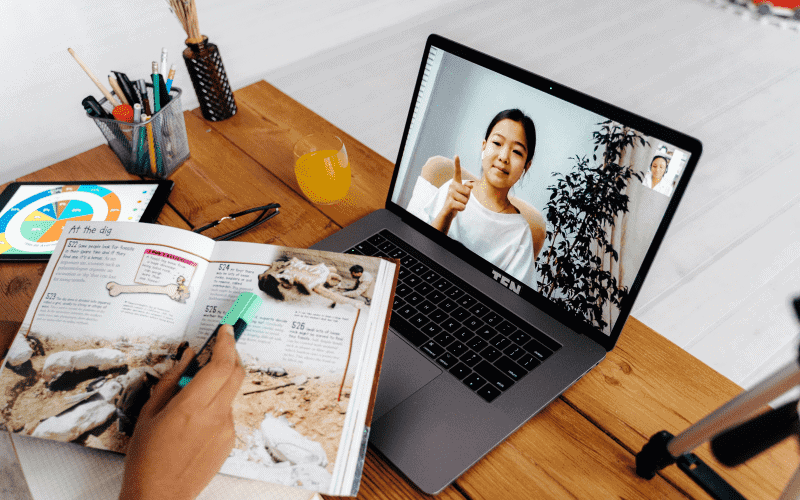
Next Steps
As you conclude your interviews with your elderly relatives, you’ll want to pull it all together and incorporate what they have shared into your overall family history. Whether you are keeping files, developing a family tree with details, or compiling information to turn into a book for your family, continue to find new ways to obtain, refine, and share what you learn.
Recap of key points
Interviewing elderly relatives can not only be informative, but also fun for both of you. It can also easily get off track, and you’ll find afterward that you failed to ask all your questions or obtain important information to fill in the blank spaces of your research so far.
To help, here is a recap of key points:
- Develop a research plan with a clear objective for each interview you conduct.
- Compile questions that relate to the particular relative you are interviewing. This requires that you first conduct research that in some way relates to them, so you can craft better questions that cater to their particular lives and experiences.
- Prepare your relative by explaining what you are looking for and the type of questions you want to ask.
- Remain conversational throughout the interview and avoid resemblance to an interrogation.
- Combine straightforward biographical questions with open-ended ones in order to get your loved one to open up.
- Encourage storytelling, perhaps around a photo, family heirloom, or specific topic like holiday traditions.
- Determine the best way to conduct the interview, either face-to-face, over the phone, or through video conferencing.
- Utilize the numerous resources available to you, such as templates, publications, books, online courses, and more.
Additional resources:
Conducting a Family History Interview, AmericanAncestors
What’s Your Story? Conducting Interviews for Genealogical Research, New York Public Library
Getting Your Older Relatives to Open Up about Family History, Ancestral Findings
The Benefits of Personal Stories in Genealogy Research
There are so many benefits to including personal stories in your genealogy research. These personal stories can:
- Help you feel more connected to your relatives, past and present,
- Connect generations, increasing the interest for younger generations to get involved
- Strengthen family bonds, making you and others in your family feel part of something bigger.
- Provide you with a better sense of identity
- Help you obtain a more resilient nature once you see what your ancestors survived.
- Elicit inspiration
- Pass on traditions and cultural identity
- Help you better understand family values and beliefs
- Allow you to see your relatives in a new light, as people doing the best they can with what they know and have.
Additional resources:
How Family Stories Shape Our Identities, FamilySearch Blog
6 Benefits of Knowing Your Family History, StoryTerrace
Encouragement to continue learning and improving skills
The more you learn, especially through interviewing family members, the more your curiosity and interests can escalate. As such, you’ll want to continue learning and improving your skills in not only interviewing techniques but also other genealogical research methods and ways to compile and share your family stories.
Perhaps you encountered a mystery somewhere in your family research, something subtle like a fire that destroyed an important building, but no one is sure how it started. Or it could be something confusing, like why your great-grandfather is pictured on a US Navy ship, but you have no record of him ever serving on that particular one. You’ll need to discover new ways to find the information you want.
You can also benefit from joining the genealogy community and finding ways to continue improving your skills. Attend workshops and seminars in your state or online. Go to local meetings and enjoy conversations with like-minded people who can help you continue to learn and stay interested.
Additional resources;
Genealogy Problem-Solving Academy, Genealogy In Action with Julie Cahill Tarr
Joining the Genealogy Community, National Genealogical Society
Genealogy Research Skills Improvement, The Occasional Genealogist
Oral History Best Practices, Oral History Association OHA
How to Do an Oral History, Smithsonian Institution Archives
Oral History Interviews: Planning an Oral History Project, The Library of Congress

Quickly and Easily Search Almost Anyone's:

Disclaimer: We rank sites based on our knowledge and experience. Our team visits each site and evaluates each one before placing it online. Though we do accept referrals, we guarantee that the information we share is accurate and that we will only pass on information that we think is helpful to our visitors. The referral fees that we receive go to paying our team and keeping our website operational.
OurPublicRecord.Org is a privately owned and operated website and is NOT affiliated with the US Government or any law enforcement agency.